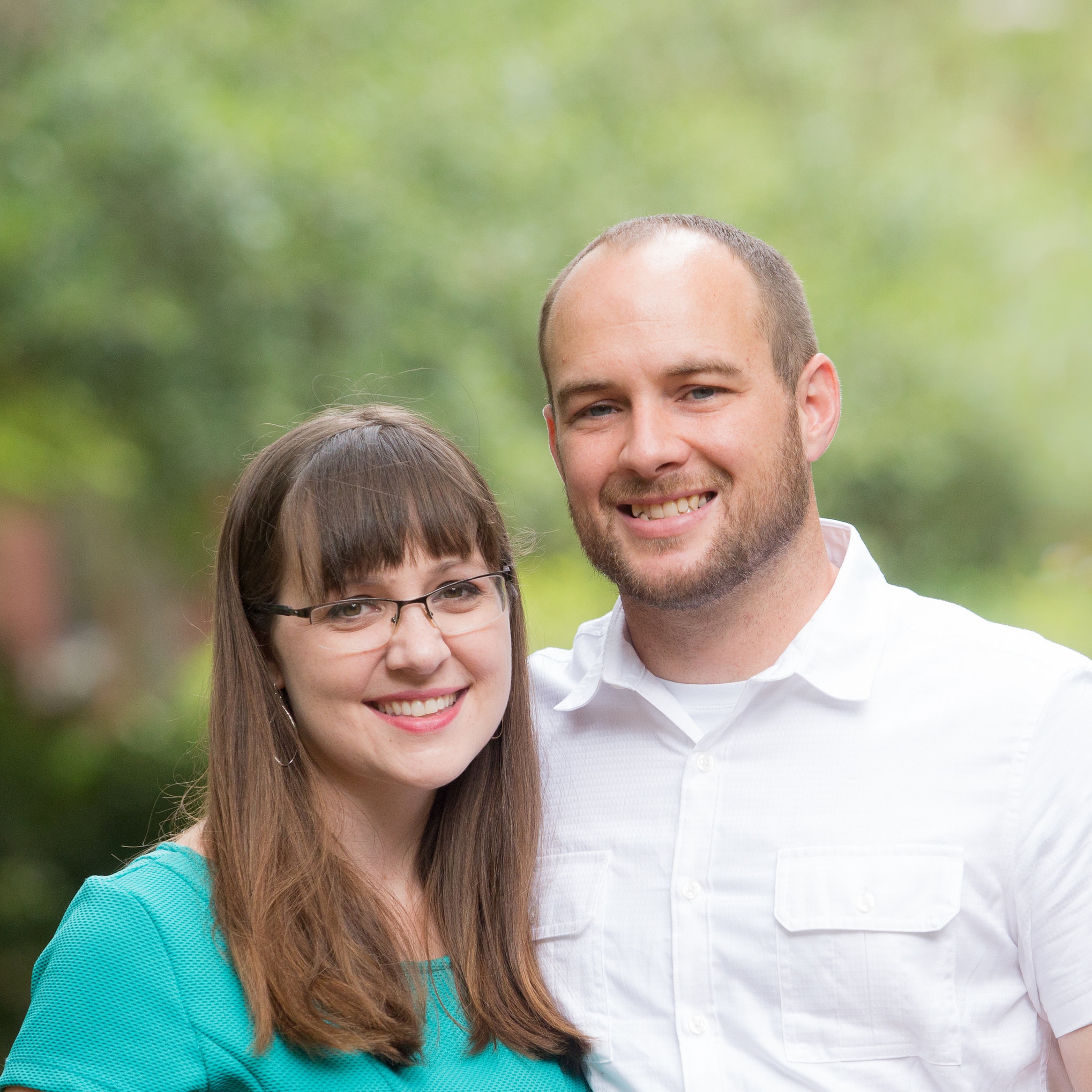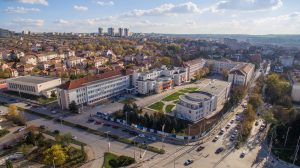We build up disciples, found churches and further the Kingdom.
About Pastor

Jonathan and his wife Amy moved to Pleven in August 2016 with the intention of making disciples and planting churches in the city of Pleven and the surrounding region. Jonathan received a B.S. in Youth Ministry and Bible from Welch College in Nashville, Tennessee (2003) and a M.Div in Educational Ministry from Columbia International University in Columbia, South Carolina (2009). Before arriving in Bulgaria, he served for several years as a youth pastor and a pastor in South Carolina.
Jonathan, Amy, and their two daughters first came to in Bulgaria in 2013. Their first role was to provide support for New Life church in Svishtov. During the three years that they lived in Svishtov, Jonathan preached regularly at the church and helped in other ways where there were needs. He taught English at a local high school and led English clubs for teenagers, university students, and adults. Jonathan and Amy are passionate about helping others find hope in Jesus Christ and come to a deeper understanding of the life-changing truths that are found in the Bible.
Connect with Jonathan on Facebook
-
Mission
God is not just a “higher power” or energy. He is a triune personal God. In Bulgarian Protestant Church “New Life” we believe that God exists and that He has revealed Himself to us through creation, Biblical revelation, and the incarnation of God’s Son Jesus Christ. We believe that the Bible helps us understand more about who God is and what purpose He has for our lives. The truth and wisdom which are found in the Bible can impact every aspect of our lives.
Mission Nov Zhivot Pleven is associated with the Bulgarian Protestant Church “New Life.” We exist to create opportunities for people in the region of Pleven, Bulgaria to learn more about the Bible and to better understand the purpose that God has for their lives. We believe that faith in God’s Son Jesus Christ, whom we learn about through the Bible, not only gives our life meaning and purpose, but also offers hope for the political, economic and spiritual crises that our society faces. As we gather to study the Bible, worship God, and pray together, we learn to better obey Him, love those around us, and make our world a better place.
We invite you to join us on an incredible adventure – come and get to know more of this incredible God, the purpose He has for your life, and the hope that He can bring to our families, our nation, and our world. Join us for an individual Bible study, a community Bible study, or special event hosted by Mission nov zhivot Pleven. We believe that it will change your life!
-
Purpose statement of New Life:
We build up disciples, found churches and further the Kingdom.
What does this mean?
1. We make disciplesA disciple of Jesus Christ is a person who loves Him, believes in the saving work He accomplished for them on the cross, repents of old life of sin, and commits to live their life for His glory. Mission Nov Zhivot exists to help people know and understand how they can become followers of Jesus Christ. We are here to help followers of Jesus continually grow in their faith and knowledge of Him.
2. We found churches
A local church is a community of believers (disciples) who gather together to worship God, study His word, encourage each other in the faith, and reach out to their community. We are here to establish healthy, strong, God-honoring churches which help disciples of Christ grow in their faith.
3. We further the Kingdom
The “Kingdom of God” is a phrase that is used in the Bible to describe all of those who believe in God, turn to Him for salvation, and submit their lives to His authority (allowing Him to “rule” over their hearts). We want as many people as possible in our city, our country, and our world to hear the Gospel and to choose to follow Jesus Christ—to become a part of God’s “kingdom.” We are here to equip, encourage, and embolden disciples of Christ to not merely keep the good news of salvation in Jesus Christ for themselves, but to share it with others, expanding God’s kingdom.
-
We believe…
- God is the Creator, Sustainer, and Righteous Ruler of the universe. He has revealed Himself in nature, and in the Scriptures of the Holy Bible as Father, Son, and Holy Spirit: yet as one God.
- Jesus Christ – He is God’s unique Son; the only one of a kind. The Scripture teaches that He is God revealed in flesh. In His Divine nature He is truly God and in His human nature truly man. He is the One once crucified for man’s sin, the now risen and glorified Savior and Lord who mediates between God and man and who gives us access to the Father through His intercession. None can come to the Father unless they come through Him.
- Holy Spirit – All of the attributes of God are ascribed to the Holy Spirit by the Scriptures. It is He who convicts and convinces men of their sin. He also convinces man of that which is right, and that a final day of judgment will come. He, it is, who comes to live in us at conversion, to open our understanding to the Scripture, and to lead us into the truth.
- The Bible – God used holy men to write the Scriptures. They are, in both the Old and New Testaments, the very words God intended us to have. They are, as given by God, without error and are our only rule of faith and practice. We profit from them by learning the truth about many things: they also speak to us about wrong doing; they even correct us and get us back on course as well as instructing us in right living.
- Man – God created man in a state of innocence. Man, being tempted by Satan, yielded and willfully disobeyed God, becoming a sinner and incurring God’s judgment upon sin. All of Adam’s descendants inherit his fallen nature and thus have a natural inclination to sin. When one comes to an age of accountability, he is guilty of sinning before God and in need of salvation.
- God’s Relationship to His Creatures and Creation – God exercises a wise and benevolent providence over all beings and things. He maintains the laws of nature and performs special acts as the highest welfare of mankind and His created order of things require.
- Salvation – Man receives pardon and forgiveness for his sins when he admits to God that he is a sinner, when in godly sorrow he turns from them and trusts in the work of Christ as redemption for his sin. This acceptance of God’s great salvation involves belief in Christ’s death on the cross as man’s substitute and the fact of God’s raising Him from the dead as predicted. It is a salvation by grace alone and not of works.
- Who Can be Saved? – It is God’s will that all be saved, but since man has the power of choice, God saves only those who repent of their sin and believe in the work of Christ on the cross. Those who refuse in this life to repent and believe have no later chance to be saved and thus condemn themselves to eternal damnation by their unbelief.
- Perseverance – We believe that there are strong grounds to hope that the saved will persevere unto the end and be saved because of the power of divine grace pledged for their support. We believe that any saved person who has sinned (whether we call him a backslider or sinner), but has a desire to repent, may do so and be restored to God’s favor and fellowship. Since man, however, continues to have free choice, it is possible because of temptations and the weakness of human flesh for him to fall into the practice of sin and to make shipwreck of his faith and be lost.
- Gospel Ordinances – Free Will Baptists believe the Bible teaches two ordinances for the church to practice: Baptism in water by immersion and the Lord’s Supper, to be perpetuated until His return.
- Resurrection – Free Will Baptists believe the Scriptures teach the resurrection of the bodies of all men, each in its own order; they that have done good will come forth to the resurrection of life, and they that have done evil to the resurrection of damnation.
- Church Government – Free Will Baptist churches enjoy local church autonomy (self-governing). The local church is the highest authority in the denomination. Local churches voluntarily organize themselves into quarterly meetings, district, state, and national associations for the purpose of promoting the cause of Christ on the local, state, district, national, and world-wide level.
- Christ’s Second Coming – The Bible teaches that Jesus Christ, who ascended on high and sits at the right hand of God, will come again to close the Gospel dispensation, glorify His saints, and judge the world.
- Missions – Free Will Baptists believe that Jesus commanded the church to go into all the world and preach the Gospel to every creature. For an in-depth study of Free Will Baptist beliefs and practices, ask for a copy of the Free Will Baptist Treatise.
History of Free Will Baptists and Bulgarian Protestant Church “New Life”The name “Free Will Baptists” is used for the first time even the 60s of the 17th century in England to denote baptists who called themselves ‘freewillers’. The name was a term of derision referring to our conviction that every person has free will to accept or reject God.
Colonial Roots
Free Will Baptists sprang up on two fronts in Colonial America. The southern line, or Palmer movement, traces its beginnings to the year 1727 when Paul Palmer organized a church at Chowan, North Carolina.
The northern line, or Randall movement, had its beginnings with a congregation organized by Benjamin Randall June 30, 1780, in New Durham, New Hampshire. Both lines of Free Will Baptists taught the doctrines of free grace, free salvation, and free will, although from the first there was no organizational connection between them.
The northern line expanded more rapidly in the beginning and extended its outreach into the West and Southwest. In 1910-1911 this body of Free Will Baptists merged with the Northern Baptist denomination, taking along the great majority of its 1,100 churches and all denominational property, including several major colleges. In 1916, a broad Cooperative General Association was formed at Pattonsburg, Missouri. The new association included delegates from the Randallite churches that had resisted the merger, while others owed their origins to the Palmer movement.
Free Will Baptists in the southeastern United States, having descended from the Palmer foundation, often manifested fraternal relationships with Free Will Baptists of the Randall movement in the north and west, but the slavery question and the Civil War prevented formal union between them. The churches in the southern line were organized into various associations and conferences from the beginning and finally organized into a General Conference by 1921. These congregations were unaffected by the merger of the northern movement with the Northern Baptists.
A New Movement
It was inevitable that a fusion between the Cooperative General Association and the General Conference of Free Will Baptists would finally come. In Nashville, Tennessee, on November 5, 1935, representatives from the two bodies met and organized the National Association of Free Will Baptists.
The new body adopted a Treatise, which set forth basic doctrines and described the faith and practice that had characterized Free Will Baptists through the years. After being revised on several occasions, this document continues to serve as a guideline for a denominational fellowship comprising more than 2,400 churches in 42 states and 14 foreign countries.
“New Life” in Bulgaria
The first New Life Church in Bulgaria, as part of the Free Will Baptist Movement, was founded in the town of Svishtov in 2011 by Pr. Timothy & Lydia Awtrey, missionaries of the denomination. In 2013 there came the family of Jonathan and Amy Postlewaite who at present are helping the work in Svishtov. The same year Trif and Vanya Trifonovs founded a New Life Church in Varna.
The new denomination was registered on September 10th 2014. In 2015 a new missionary family, Josh and Lydia Provow, arrived in Svishtov.
Used with permission from Free Will Baptist History.
Connect
email: Jonathanandamyp@yahoo.com
tel. 089 260 9557





